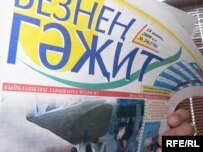Paul Goble
Vienna, April 28 – Last Friday’s conviction in a Naberezhny Chelny court of a Tatar activist who had spoken out against the baptism of Tatar infants by a Russian Orthodox priest without the permission of their parents or guardians has sparked protests from the Tatar Social Center (TOTs) as well as from human and religious rights groups elsewhere,.
On Friday, the court found TOTs leader Rafiz Kashapov guilty of provoking interethnic and inter-religious hostility (under Section 1 of Article 282 of the Russian Criminal Code) for his article “No to Christianization!” in which he protested the baptism of infants of Tatar nationality, a traditionally Muslim people, and gave him a suspended sentence of 18 months
That article appeared on Kashapov’s blog shortly after a Russian Orthodox priest baptized the children on January 16th of this year without the knowledge or agreement of their parents. His article led to protests in several cities of Tatarstan, and his blog was subsequently suppressed by the authorities.
Now, following Kashapov’s conviction and protests by several rights groups, his own Tatar Social Center has issued an appeal to human rights groups, social and political organizations, and the media of Tatarstan and Russia, denouncing this action and demanding that the authorities reverse course.
But it is a measure of the extent to which the Russian government is in control of the media that the appeal has so far appeared only on other blogs – see, for example, the complete text at blogs.mail.ru/mail/hamm77/38E6454E2B52C97F.html – or on websites hosted beyond the borders of Russia — mariuver.wordpress.com/2009/04/28/sud-kashapovym/#more-7976.
The declaration, signed by A.Sh. Zalyalutdinov, the chairman of the regional TOTs Assembly, and M.A. Shakirova, the secretary of that group, provides a remarkable portrait of the increasingly frequent misuse of Russia’s anti-extremist laws and the also increasingly frequent cases of official and especially judicial malfeasance in that country.
After outlining the history of Kashapov’s own protest, the declaration states that the investigation of his case occurred “with crude violations of the law,” including moves by officials that prevented the accused attorneys from gaining access to information gathered by the government.
The trial itself, the declaration continues, was “closely controlled by the Moscow FSB and the court was subject to strong pressure from the prosecutor.” Moreover, the court’s decision reflected only the testimony of “experts” from Moscow and Kazan because the judge refused to consider “the declarations of independent experts” that were offered by Kashapov.
Both the facts of the case and these violations of judicial procedure, the authors of the declaration say, provide the basis for considering that “the sentence of the court is both without foundation and illegal.” And they say that lawyers for the accused will appeal the decision to the Supreme Court of Tatarstan.
“Many human rights activists, public figures and journalists,” the declaration continues, not only in Tatarstan and Russia but in foreign countries have raised their voices in defense of Rafiz Kashapov, an important public figures who has stood up for the rights and interests of the Tatars and other peoples.”
“We express our deep gratitude to them!” the appeal concludes, especially since some of them, like Ulyanovsk journalist Sergey Kryukov, have themselves become the object of Russian government persecution as a result. Kryukov’s location at the present time, the appeal notes, is unknown.
The Kashapov case, as tragic as it is for him and for the Tatars, highlights two more widespread problems in the Russian Federation, both of which have been well-documented in recent times. On the one hand, Russian courts, as Moscow statistics show, are ever more willing to convict anyone the regime brings charges against (www.vestnikcivitas.ru/pbls/650).
And on the other, the Russian government, for all the talk about “a thaw” under Dmitry Medvedev, appears to be increasingly willing to control reporting about what is actually going on, either by taking down websites as in Kashapov’s case or directly corrupting journalists (www.russiamediamonitor.com/News.html).
In Soviet times, the Western media could be counted on to report such things, but unfortunately, their interest in doing so for whatever reason has declined. And as a result, those who do notice such abuses in Russia especially beyond Moscow’s ring road have a special obligation to try to bring them to the attention of others.
http://windowoneurasia.blogspot.com/2009/04/window-on-eurasia-conviction-of.html




